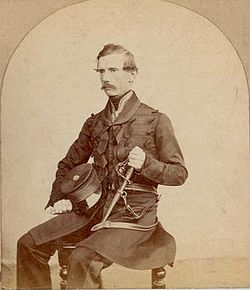- Alexander Ross Clarke
-
Not to be confused with Alex Clark or Alex Clarke.
Alexander Ross Clarke 
Alexander Ross Clarke in 1861.Born December 16, 1828
Reading, Berkshire, EnglandDied 11 February 1914
Strathmore, Reigate, SurreyNationality United Kingdom Fields geodesy Known for reference ellipsoids Alexander Ross Clarke (1828–1914) was a British geodesist, primarily remembered for his work defining different reference ellipsoids approximating the shape of the geoid.
Clarke was born on December 16, 1828 in Reading, Berkshire, England. He spent his childhood in the British colony of Jamaica, until his family returned to England.
On October 1, 1847 he joined the British army and was assigned to the Royal Engineers. He got his training at Chatham in Kent, at the School of Military Engineering. In 1850 he was transferred to the Ordnance Survey in Southampton.
From 1851 to 1854 Clarke served in Canada, where he married Frances Dixon in 1853.[citation needed] The couple had four sons and nine daughters.
On his return to England he served again with the Ordnance Survey in Southampton, where in 1856 he became director of the measurement department. In 1858 he published his first article on the history of land surveying in Great Britain. On June 5, 1862 he was elected to the Royal Society.
In 1866 he described a new reference ellipsoid, known as Clarke 1866 and still used today, particularly in English-language countries and areas. In his 1880 book Geodesy he described a different ellipsoid, known as Clarke 1880, which is used mainly in Africa.[citation needed]
After he had served 27 years in England, he was formally obliged to serve overseas. Upon receiving notice of transfer, Clarke submitted his resignation. Soon after, he withdrew from the Royal Society for financial reasons.
In October 1883 Clarke was the British delegate at the geodetic conference in Rome, and in 1884 he represented Britain at the International Geodetic Conference.
From the Royal Society he received the gold medal,[1] and was re-elected to membership and his dues were waived.[citation needed]
Alexander Ross Clarke died on 11 February 1914 in Strathmore, Reigate, Surrey.[citation needed]
References
- ^ "CLARKE, Alexander Ross". Who's Who, 59: pp. 339–340. 1907. http://books.google.com/books?id=yEcuAAAAYAAJ&pg=PA339.
- Colonel Sir Charles Close, K.B.E., C.B., C.M.G., F.R.S. "The Life and Work of Colonel Clarke." The Royal Engineers Journal Vol. XXXIX, No. 4 (December 1925), pp. 658–665.
External links
 Works written by or about Alexander Ross Clarke at Wikisource
Works written by or about Alexander Ross Clarke at Wikisource- http://www.reubique.com/clarke.htm
Categories:- 1828 births
- 1914 deaths
- Geodesists
- Fellows of the Royal Society
- Royal Medal winners
Wikimedia Foundation. 2010.
